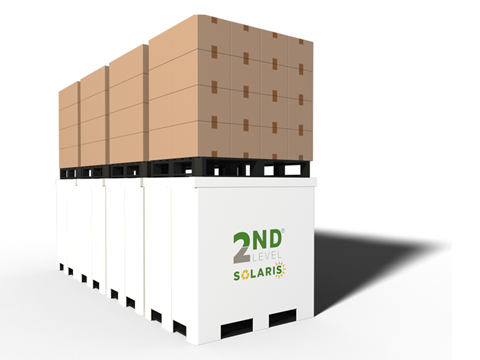
In response to plastic waste concerns in the logistics sector, 2nd Level Global Solutions has developed Solaris – a range of 100% paper-based, completely recyclable, and water-resistant thermal pallet covers that protect palletized goods against temperature fluctuations in transit.
Engineered from an ‘advanced fusion of paper’, the Solaris range has undergone testing and reportedly matches the performance of conventional plastic thermal covers. Its white reflective coating is said to achieve a ‘superior’ thermal performance, with a micro-convective air pocket providing additional insulation.
It is also designed to resist water and tearing, and to protect products against damage and other hazards.
Four products are available to suit a range of needs, starting with Solaris 5. This version features six layers of tear- and water-resistant specialty paper and intends to provide up to 7.5 hours of protection at 40°C.
Solaris 10 constitutes twelve layers and is ‘more robust’, as it extends the cover’s temperature protection up to 9 hours.
The thickest free-standing cover, Solaris 25, is made up of twenty insulation layers. As such, its temperature protection is believed to reach 10 hours.
Finally, Solaris S20 is made of structural corrugated cardboard and claims to enable loads of up to 500kg stacked on top. It therefore doubles freight capacity and enables more goods to be transported in one trip, while also cutting down on fuel consumption, carbon emissions, and transport costs.
2nd Level recommends that the covers be used in any industry that transports temperature-sensitive goods, such as pharmaceuticals.
Commercial director Mark Hammond explains: “Plastic thermal covers, commonly used in global shipping, generate significant waste, with a large proportion ending up in landfills. These covers often fail to be recycled due to the complexity of their composite silver foil and plastic material composition.
“Solaris, on the other hand, is constructed entirely from paper and is 100% recyclable, providing a greener solution without compromising the integrity of temperature-sensitive cargo.
“With Solaris, we offer companies a sustainable way to protect their products while reducing their carbon footprint. Solaris pallet covers come with an independently calculated Product Carbon Footprint (PCF) figure based on ‘cradle-to-customer plus end of life’.
“The logistics industry desperately needs solutions that help reduce plastic waste, so Solaris is a game-changer.”
Another effort to introduce paper into the logistics space came to light late last year, when DS Smith helped Vilsund Blue A/S transport canned seafood with corrugated cardboard instead of plastic pallets. This solution claims to increase the number of canned units on each individual pallet while enabling products to be stacked and stored more efficiently.
SeaCube also pursued decarbonization in refrigerated transport with reefer leases powered by Greensee’s AI-driven CO2 emissions reporting technology, and by collaborating with Thermo King and CMA CGM to test battery-powered container gensets.
Meanwhile, Labelmaster’s DGeo packaging division and Altor Solutions subsidiary Lifoam Industries hope to tackle pollution caused by temperature-controlled expanded polystyrene impact packaging by applying a biobased additive. The packaging is then believed to biodegrade by 92% in a bioreactive landfill over four years, all without leaching microplastics.
If you liked this story, you might also enjoy:
The ultimate guide to the Packaging and Packaging Waste Regulation in 2024
How are the top brands progressing on packaging sustainability?
Sustainable Innovation Report 2024: Current trends and future priorities
Everything you need to know about global plastic sustainability regulation














No comments yet